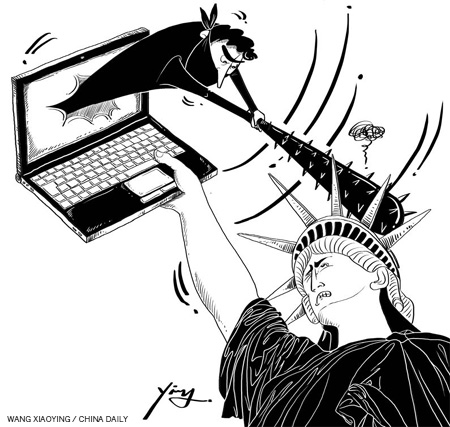Op-Ed Contributors
The Net and how the US is caught in it
Updated: 2011-06-22 07:54
By Huang Shejiao (China Daily)

The importance of the Internet for a country's economy, politics, culture, social progress, modernization and military buildup in today's world cannot be over-emphasized. Countries are giving special care to developing and securing the Internet, for just like all things new, the Internet is a "double-edged sword", which has its advantages and disadvantages.
Not long ago, Russian President Dmitry Medvedev said the global Web network could be constructive and destructive both. Hence, the government should pay closer attention to websites that contain information on manufacture and trafficking of drugs and explosives.
And Europol's top official warned recently that the Internet had become a major tool of organized crime in the European Union, and is used mainly for drug smuggling, human trafficking, money laundering and cyber-crime.
To eliminate the negative aspects of the Internet, countries such as the United States, the United Kingdom, France, Japan, Australia, Singapore, the Republic of Korea and Sweden have promulgated laws and regulations, and formed special agencies to supervise the Web.
China has 457 million Internet users, the highest in the world, and about 3.23 million websites. Given the challenges created by the Internet and the importance of protecting national and netizens' security and maintaining a good environment on the Internet, China has set up the State Internet Information Office to direct, coordinate and supervise online content management, and investigate and punish websites violating laws and regulations. The measures are necessary any which way we look at them.
Anyone can access the Internet and express his/her opinion, or even slander others or undermine a country's national security. For hackers, too, the Internet is a free world. Governments need to guard against the Internet because it can be used as a means to undermine a country's sovereignty or security, or both. But some US politicians, still suffering from Cold War mentality, have been using cyberspace to cast aspersions on or subvert governments that they don't like.
The way the US has used the Internet to push its agenda against some countries in North Africa and the Middle East to cash in on the upheavals there proves this point. The Internet as a tool fits perfectly into Washington's idea of intervening in other countries' internal affairs. Encouraged by the changes, US politicians have called for "total Internet freedom" on many occasions.
US Secretary of State Hillary Clinton has even said that Internet freedom is one of the criteria of human rights protection, and she is pushing to make Internet freedom a central part of Washington's foreign policy. In fact, the US administration has vowed to spend millions of dollars to develop new tools and help sustain so-called online dissident activists in other countries.
But "Internet access without control" creates security problems for the US, too. An FBI official in charge of network affairs has said that tens of thousands of cyber-attacks are launched against the US. After the Sept 11, 2001, terrorist attacks, the US has accorded greater priority to preventing terrorists from launching Internet attacks and "stealing" American assets or damaging the country's core infrastructure, which might cripple US society.
In May 2010, the US set up Cyber Command, which is in charge of protecting American information network security. The US' first international strategy for cyberspace was released last month, and it called for the establishment of new international norms for cyberspace through multilateral and bilateral cooperation to protect US interests.
According to the US' international cyberspace strategy, computer sabotage engineered from another country can constitute an act of war, and the US will respond to such an act through traditional military force.
This indicates the US intends to launch armed attacks on its adversaries or potential adversaries whenever it deems fit. Recently, some US arms and network companies were abuzz with having suffered cyber-attacks and seemed to point a finger at China, which is totally groundless. A Canadian security expert doubts whether the US can ever be certain whether the attacks were launched from China, because expert hackers tend to cover their tracks and can easily disguise the place from where they launch their attacks. Depending on its Internet technological edge, and combined with the so-called Internet freedom as an important adjunct to its global diplomacy, the US seems to be out to suppress its competitors. Such "double-standard" tactics will only increase frictions among countries and could deal them deadly blows if not managed properly.
The author is a research scholar with the China International Studies Research Fund.

Specials

My China story
Foreign readers are invited to share your China stories.

Pret-a-design
Though Elisabeth Koch did not attend the Aprilweddingof Prince William and Kate Middleton in London, her tailor-made hats might have.

Mom’s the word
Italian expat struggles with learning English and experiences the joys of motherhood again.